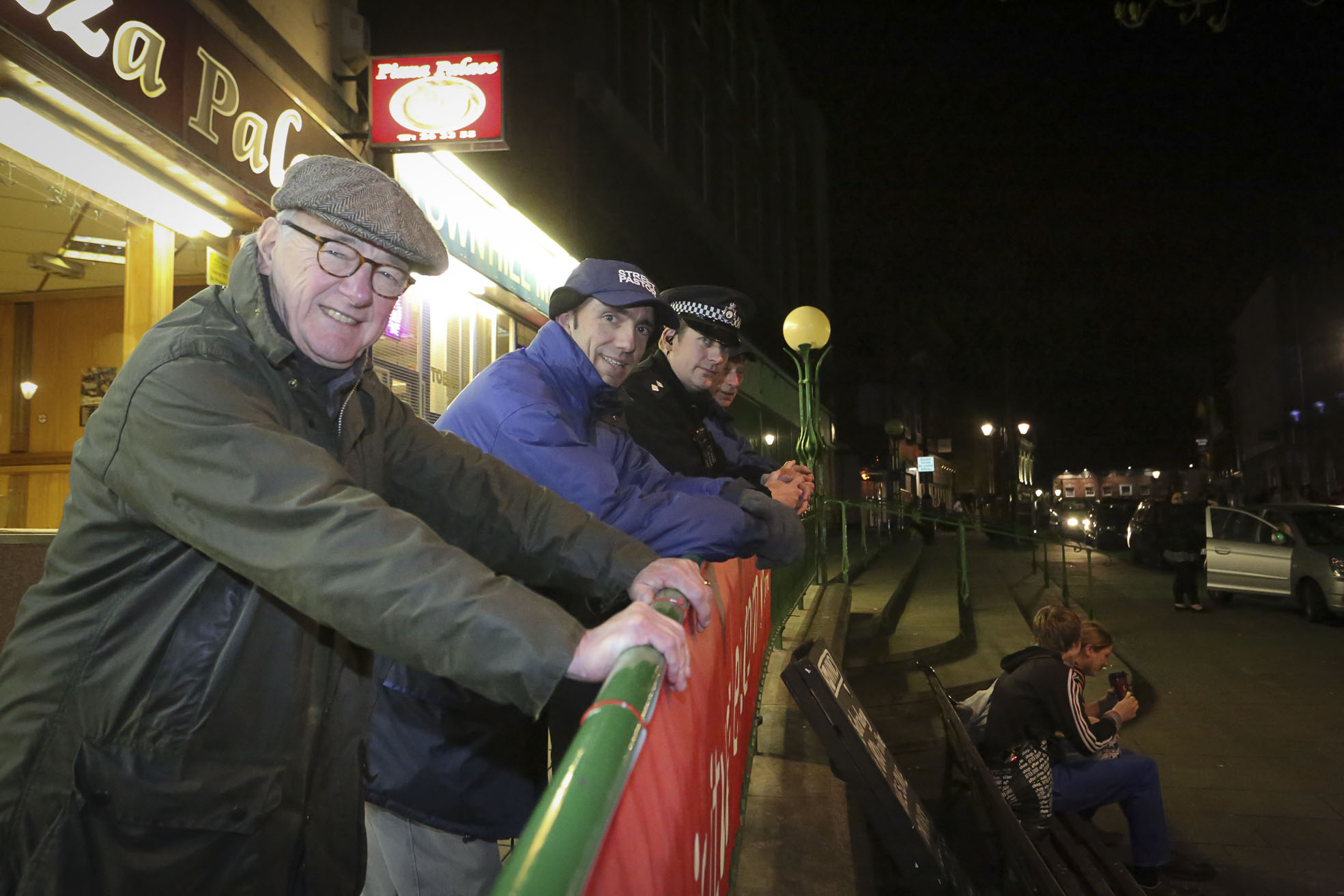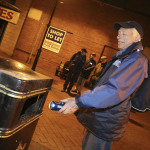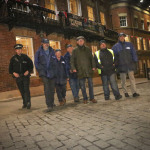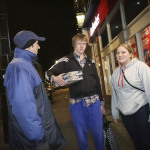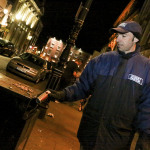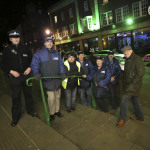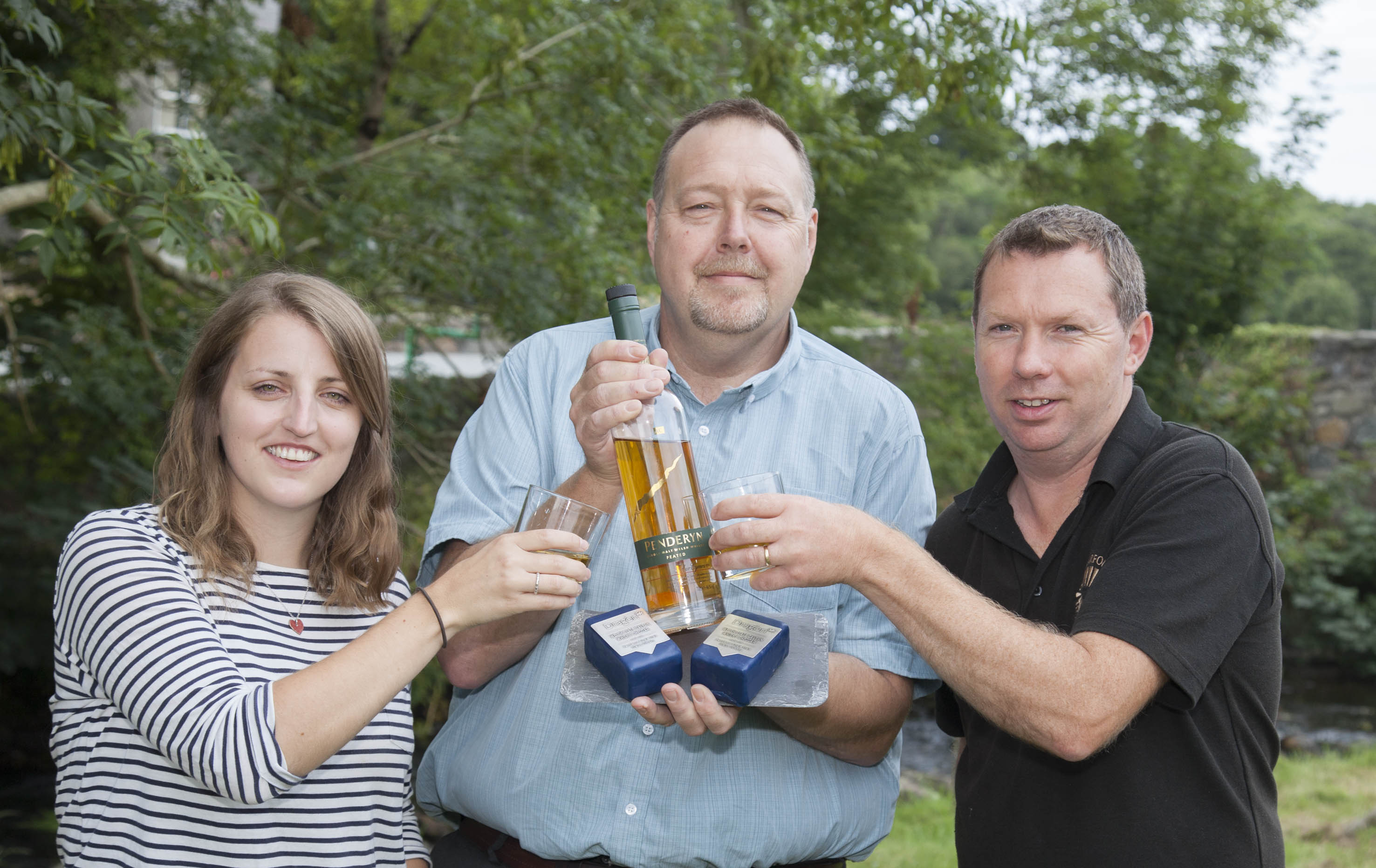Crime tsar Winston Roddick has paid tribute to a group of good Samaritans who are helping to keep the streets of Wrexham safe at night – armed with lollipops.
The North Wales Police and Crime Commissioner was speaking as he went on night patrol with the Street Pastors who give a helping hand to those affected by too much drink or other social issues.
The inter-denominational church response team was set up in 2006 and takes to the night-time streets to engage with people to offer care and a listening ear.
Violent crime in the town centre has dropped by 60 per cent since they started and there’s also been a big reduction in anti-social behaviour.
According to the Street Pastors, handing out lollipops is a great way of diffusing potentially violent confrontations.
Mr Roddick joined the group on a busy Friday evening to gain an insight into their work as Wrexham’s vibrant night-time economy got into full swing.
He said: “Street Pastors are an essential balustrade, something people can lean on for help and support when they have had too much to drink, are lost or simply in need of help.
“They have a real purpose and their efforts can easily be measured by the size of the reduction of anti-social behaviour and street crime in general that we have seen in the areas they operate within.”
“I think it’s a fact of life that people behave differently when they know there is someone observing them. The fact the Street Pastors are there calmly walking the streets and offering help when it’s needed has a remarkably calming effect.
“Having spent a night with the Street Pastors in Wrexham I really have been impressed by the work they do. The public should be very grateful as they are clearly having a very positive impact on Wrexham town centre late at night.”
According to Wrexham Street Pastors’ co-ordinator, Gareth Hughes, the minister of Christchurch, an independent evangelical church which holds Sunday services at Acton Community Resource Centre, the team is made up of people from a number of denominations.
He said: “The team was set up by the Ascension Trust and is run by myself, as co-ordinator, with support from the Trust and local churches in partnership with the police, the borough council and other agencies.
“The team works in Wrexham town centre every Saturday night and two Friday nights a month. We are usually out from 10am until 4am. It’s about having a presence on the street and offering care, practical support and a listening ear.
“When we started in 2006 it was seen as a novelty perhaps and we did get some aggression. But we are so well known now we are accepted and people actually look for us if, and when, they need help.”
He added: “What we do is look out for people who are distressed and alone. It may be they have had too much to drink and have lost their friends.
“They may be, as a result, anxious and distressed. We will step-in ensure they are supported, find their friends or even ensure they get home safely.
“To be a Street Pastor you need to be over 18, a church member and you must be able to commit to the training programme.
“The training is designed to fully equip Street Pastors to respond to the needs of all the people that they engage with on the streets and takes place over 12 sessions.
“Our oldest street pastor is 84 while we have several who are in the late teens. We now have more than 30 street pastors from 15 different Wrexham churches.”
Retired health worker Mary Roberts, 64, a member of Trinity Presbyterian Church Wrexham, really enjoys working as a Street Pastor.
She said: “I have no doubt whatsoever that people appreciate what we do. Occasionally we get people who will shout and swear at us but we just let it go over our heads.
“It’s really all about helping people who have had too much drink, or if they are sick or just in need of help. We very often find young girls drink too much and lose their friends.
“The street can be a dangerous place for girls like that so we are there to step in and offer help.
“I know my own children would go clubbing and I’d have been far happier if I’d known there were street pastors keeping an eye on the streets then.”
Mary added: “We will pick up any discarded bottles and cans and dispose of them and we carry flip-flops to hand out to girls who may have had too much to drink and can’t walk on their high heels.
“We also hand-out lollipops, it’s remarkable how a lollipop can diffuse a potentially violent confrontation!
“The scheme has definitely had a positive impact on anti-social behaviour and crime in general. I know parents are grateful for the work we do. I think people realise now it’s a voluntary service and that we don’t get paid nor are we working for the police.
“And the training we have had was really helpful. We had talks on listening skills; after all we listen far more than we talk as well as health and safety, drugs, alcohol and first aid.
“I really do believe what we do is really helpful and has prevented an awful lot of crime. And we don’t preach religion on the streets, our job is to listen and offer friendship and support.”
Police Inspector Simon Kneale stressed the work of the street pastors cannot be underestimated.
He said: “The positive impact they have had since their introduction in 2006 has been remarkable. Violent crime, such as assaults, has dropped by as much as 60% as has anti-social behaviour.
“It really is a fantastic resource to have and we love having them here helping out. They definitely offer a calming influence and are a real benefit to us. And they can save many police man hours looking after people who may have had too much drink.”
He added: “I think the public benefits from having the street pastors out on the streets on a busy Friday and Saturday night. And I think that they are now widely appreciated for the caring work they do.”
Leslie Ryder, 19, lives in Crewe but spends most weekends in Wrexham visiting his girlfriend.
He said: “I’ve got to know a few of the Street Pastors. They are well helpful especially when you’ve had a lot to drink. I’ve seen them calm things down when fights have nearly broken out.
“It’s good that they are on the streets and I think it makes things a lot safer.”

